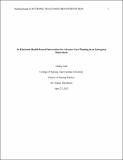An Electronic Health Record Intervention for Advance Care Planning in an Emergency Department
Author
Hall, Holley
Abstract
Advance directives help preserve patient autonomy and decision-making in situations where they cannot use their voice. Unfortunately, many individuals do not have an advance directive (AD), raising the concern for a poor patient experience, increased healthcare costs, and moral distress in family members and healthcare providers. The purpose of this quality improvement project was to design an AD screening tool to be utilized in an emergency department electronic health record (EHR) to improve screening and documentation of ADs and enhance patient awareness through education via the patient portal. Over 12-weeks, there was an improvement in screening tool utilization from 47% to an average of 56.6%, submission of 12 AD documents to the EHR, and 45 patients who requested education to be sent to their patient portal. Throughout implementation, the emergency department had 9,810 patient encounters, and 317 (3.2%) patients reported having an advance directive. Unfortunately, that leaves more than 90% of the patients without having an advance directive emphasizing the need to continue to improve patient awareness of the importance of advance care planning.
Date
2021-04-23
Citation:
APA:
Hall, Holley.
(April 2021).
An Electronic Health Record Intervention for Advance Care Planning in an Emergency Department
(DNP Scholarly Project, East Carolina University). Retrieved from the Scholarship.
(http://hdl.handle.net/10342/8955.)
MLA:
Hall, Holley.
An Electronic Health Record Intervention for Advance Care Planning in an Emergency Department.
DNP Scholarly Project. East Carolina University,
April 2021. The Scholarship.
http://hdl.handle.net/10342/8955.
June 29, 2024.
Chicago:
Hall, Holley,
“An Electronic Health Record Intervention for Advance Care Planning in an Emergency Department”
(DNP Scholarly Project., East Carolina University,
April 2021).
AMA:
Hall, Holley.
An Electronic Health Record Intervention for Advance Care Planning in an Emergency Department
[DNP Scholarly Project]. Greenville, NC: East Carolina University;
April 2021.
Collections

